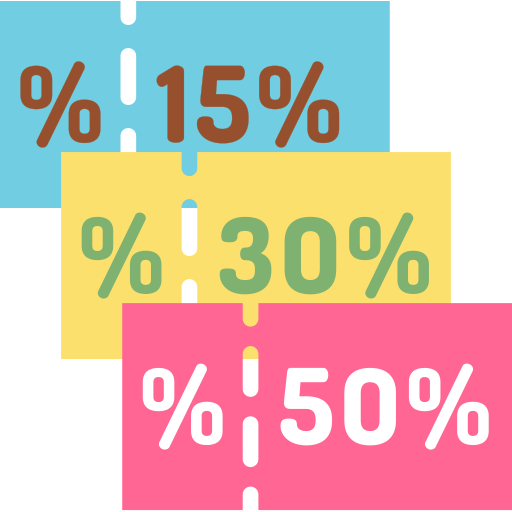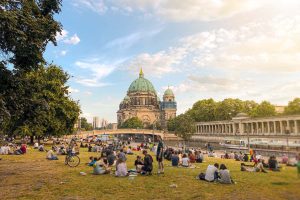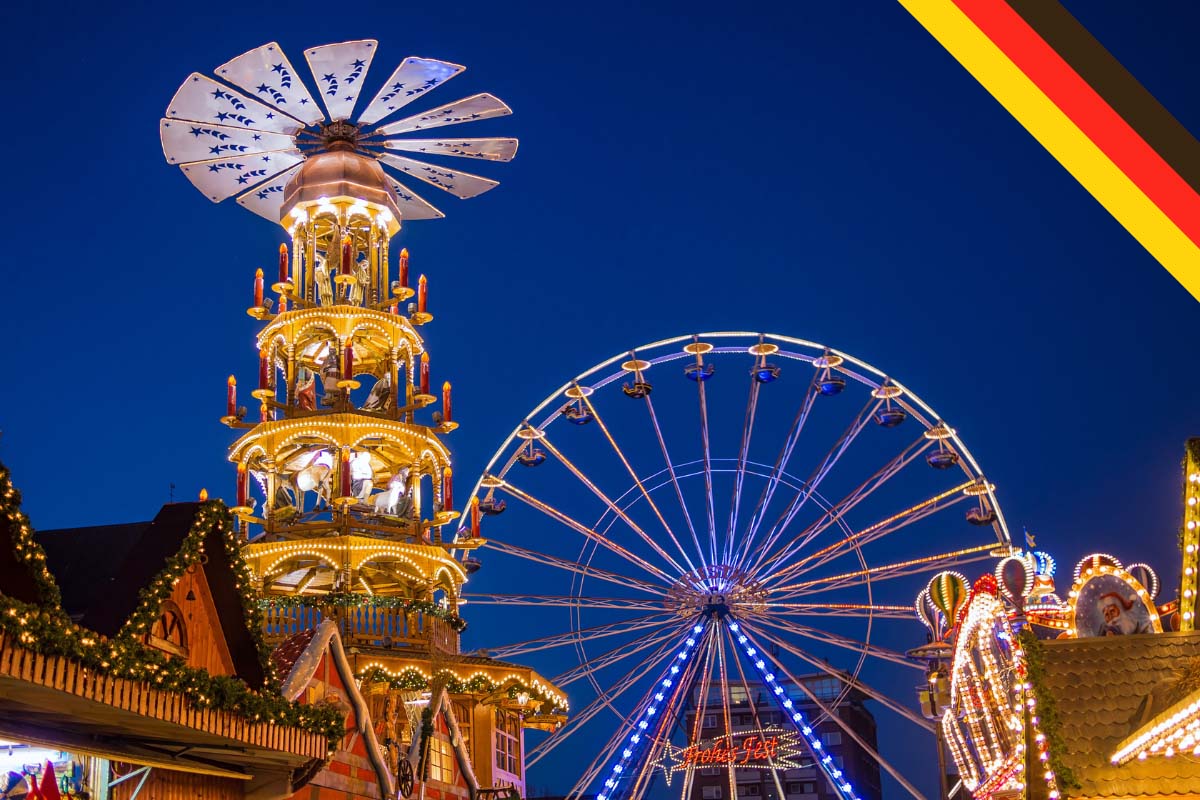
Locals share 13 essential tips you should know when visiting Christmas markets in Germany for the first time. From start dates, whether German Christmas markets are card friendly, how much to budget and what to wear to avoid getting cold.
Ever heard the saying, ‘No one does Christmas better than Germany’? Well, they’re right!
As the country that created many of our Christmas traditions, Germany truly does go all out when it comes to celebrating this magical time of the year.
And there’s no better way to ring in the festive season than visiting Christmas markets in Germany!
If you’ve never been to a German Christmas Market before, then you’ve come to the right place. As expats living in Berlin, we’re sharing with you 13 essential tips you should know before visiting.
From when they start, whether it’s card-friendly, how to dress warmly, how much to budget for, to some basic German phrases to know before visiting.
Before we jump straight into the tips, let’s answer some basic questions about German Christmas Markets first.
Will There Be Christmas Markets in Germany in 2025?
Yes! There will be German Christmas Markets in 2025! Holding thumbs that there won’t be any ‘once-in-a-generation Black Swan event’ that will change this.
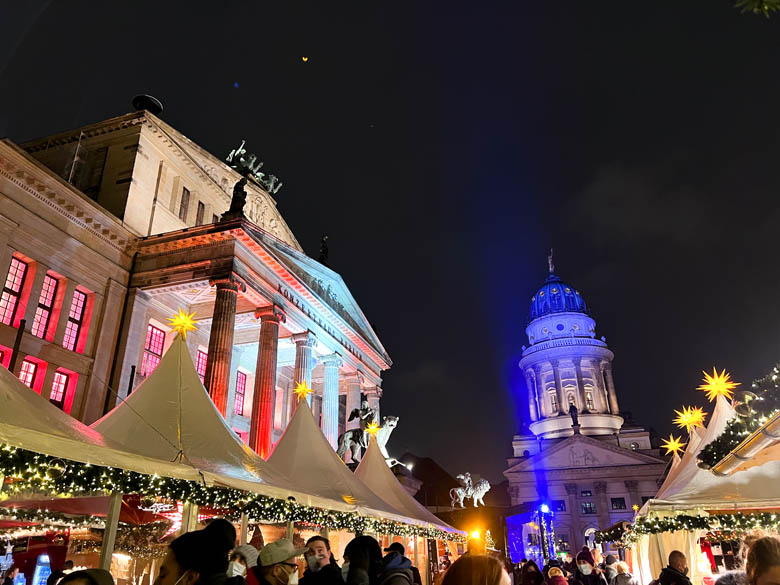
When Do Christmas Markets Start in Germany?
Most Xmas markets in Germany start a month before Christmas. The exact start dates for the Christmas market season differ slightly from city to city.
But in 2025, you can expect most markets to open between the dates 22 and 25 November and to close just after Xmas.
Bonus Tip: Most markets close between Christmas Eve (24 December) to Boxing Day (26 December). If you’re traveling to Germany to experience its magical Christmas Markets, make sure you visit before then.
Tips For Visiting German Christmas Markets
Here’s a sneak peak of the tips shared in this blog:
1. Bring Cash When Visiting Christmas Markets in Germany
If you’ve never been to German Christmas markets before, you’re probably wondering whether they take credit cards. Well, Germany is many things, but card-friendly isn’t one of them.
Yes, you read that right! You’re going to need cash money if you want to fill those bellies, drink gluhwein, or do some Xmas shopping.
Most stalls and vendors only take cash except for a minor few who sell bigger ticket items (€50 or more) like handmade Christmas decorations.
We’d recommend bringing a mixture of small notes (€10 and €20) as well as coins. You may need to pay €0.50 or €1 to use the toilets at some Xmas Markets in Germany.
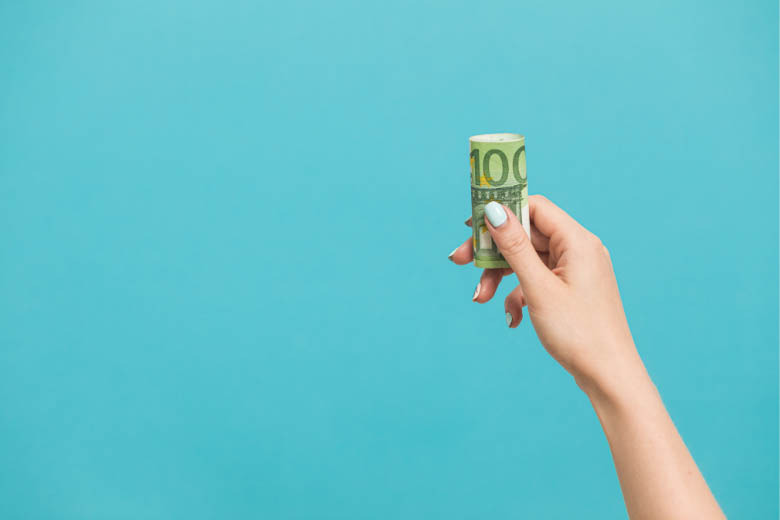
How Can I Get Cash in Germany Without Paying Fees?
Good question! This depends on the bank card you use.
If you’re using Wise, Revolut or N26 bank cards like us, you can draw at any major German bank without fees as long as it’s within your free monthly withdrawal limits.
Just head over to a Deutsche Bank, Post Bank, Berliner Volksbank, or Sparkasse ATM to withdraw and get cash for free.
You get 3 free withdrawals per month with the N26 Standard Plan (free account). Two free withdrawals per month (up to €200) with Wise (free account). And the Revolut Standard Plan (also free) allows you to withdraw up to €200 per month without fees.
Whatever you do, DO NOT draw at an EC ATM unless you have a German bank card that allows you to withdraw cash with them for free. These EC ATMs are super easy to find since they’re literally everywhere. But they will charge you a whopping €5 per transaction.
Trust us, we experienced that firsthand and we’re never making that mistake again.
Bonus Tip: If you love to travel, consider opening a free bank account with Revolut. We’ve been using Revolut for almost 4 years and we never travel without it. Not only does it allow us to withdraw cash for free at most travel destinations. But we also get the best exchange rate buying foreign currency! Find out more in our in-depth Revolut Travel Card guide.
2. Understand the German Word ‘Pfand’
This is probably one of the most important tips you should know if you’re visiting Christmas Markets in Germany for the first time. Understanding the meaning behind the German word ‘Pfand’.
‘Pfand’ (pronounced like ‘fund’ in English) means ‘deposit’ in German. You’ll come across this word whenever you buy gluhwein (German mulled wine) at most Xmas Markets in Germany.
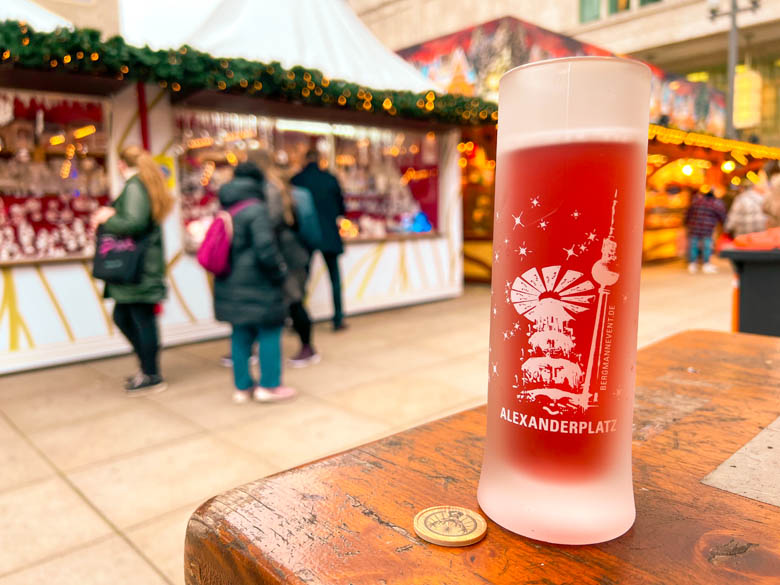
You see, Germany is a very environmentally conscious country and takes reducing waste and recycling very seriously. They take it so seriously, in fact, that you won’t usually find plastic or even paper cups. Instead, your delicious drinks are all served in a glass.
To encourage guests to bring the glasses back to the vendors, they charge an extra €3 to €5 per glass as a deposit.
So when you’re done with your drinks, either return them to get your deposit back or keep the mug as a souvenir.
You’ll probably want to keep at least one of the many festive Christmas market mugs you’ll find in Germany because they’re absolutely beautiful!
3. Collect Christmas Mugs as Souvenirs
Whilst we’re on the topic of Xmas mugs, here’s tip #3.
Each Christmas Market in Germany has their own signature mugs. Not only are these mugs unique at every market. But they’re different from each year to the next.
They make great souvenirs and unique Christmas gifts to take home for family, friends, or yourself!
In that case, simply forfeit your ‘pfand’ and take your gorgeous mug with you when you leave.
This mug from Charlottenburg Christmas Market in Berlin is one of our personal favorites!
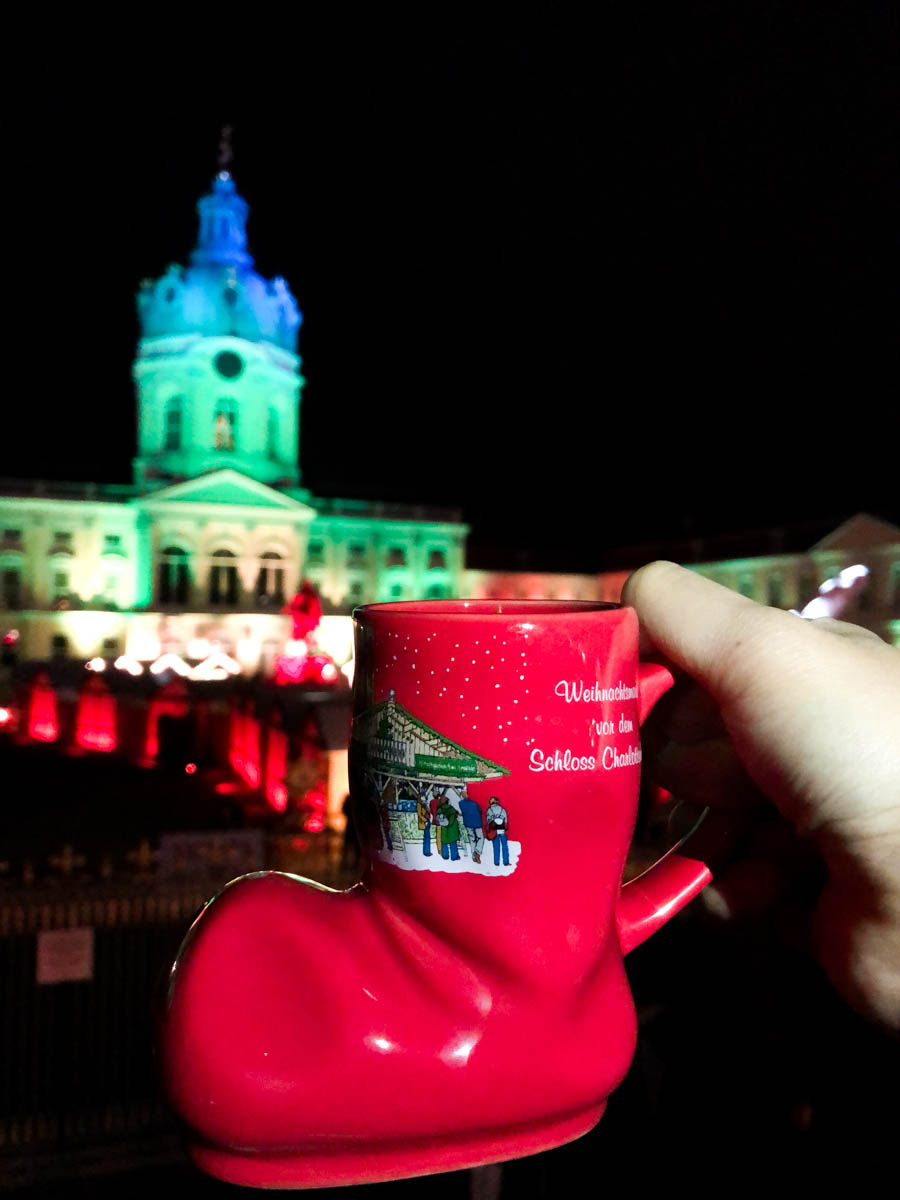
Related Guide: Planning on visiting Christmas markets in Berlin and love photography? Read our Best Photo Spots in Berlin guide for inspiration!
4. How Much Money to Budget for Christmas Markets in Germany
‘Cash is King’ when you’re visiting Christmas Markets in Germany. You’ll need cash not only for food and drinks, buying gifts and trinkets, but also for ‘pfand’ too.
So how much money should you budget for?
Our tip is to budget around €30 to €40 per person (including ‘pfand’ money). This should be more than enough for food and drinks.
Beer, gluhwein, and bratwurst cost between €3 to €6 each depending on which market you’re visiting. Some larger dishes like ‘grünkohl mit knacker’ (kale with sausage) and ‘flammkuchen’ (savory, thin pizza-like dish) cost a bit more, between €8 to €10.
Bonus Tip: This budget doesn’t include shopping. Make sure you bring extra cash if you plan to buy souvenirs and Xmas gifts.
Save Me For Later
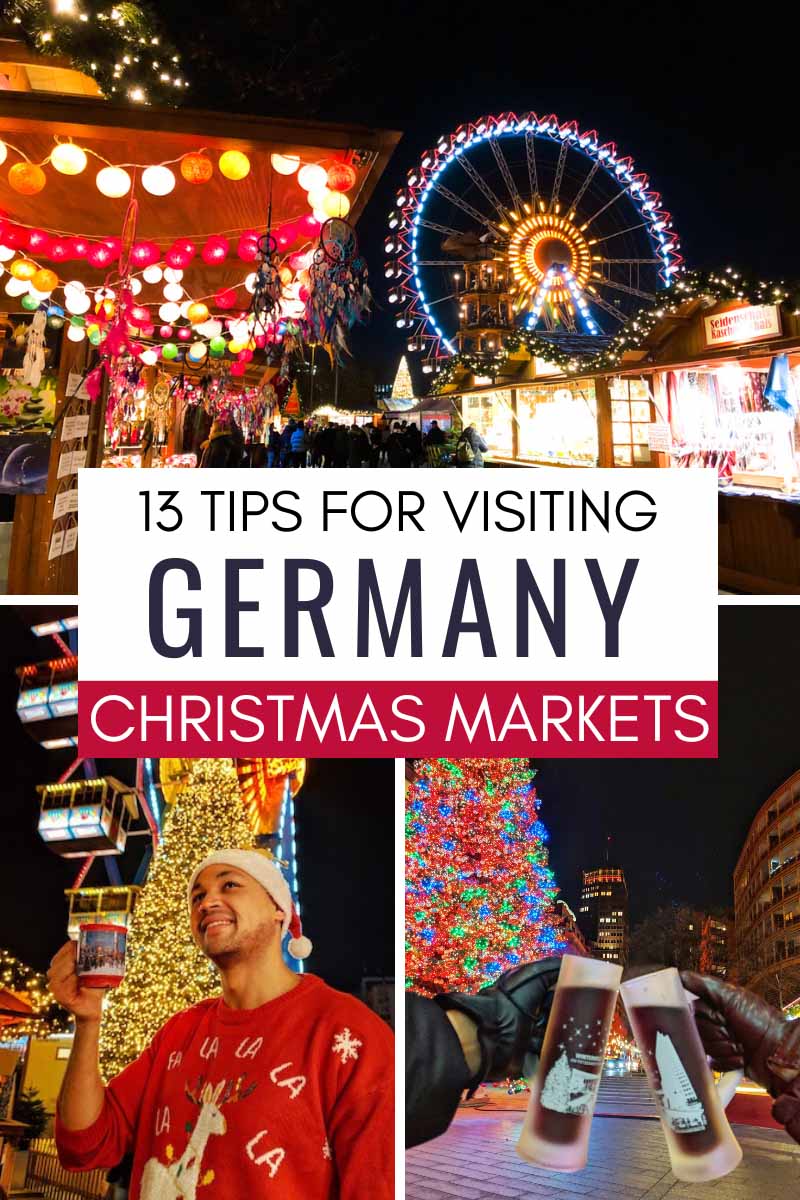
5. Book Your Hotel Early to Avoid Expensive Prices
Another essential tip to know when visiting German Christmas Markets is to book your hotel as early as possible.
Christmas time is the peak travel season for many European countries, including Germany. You’ll therefore want to book your hotel as early as possible to avoid paying sky-high prices.
We’d recommend staying close to the Christmas Markets you want to visit so you can walk instead of taking public transport. It’s a great way to walk off the gluhwein and avoid standing in the cold, waiting for the next train or tram to arrive.
Tips for Places to Stay Near Christmas Markets in Germany
The most elaborate Christmas Markets will usually be located in the center of the German city or town you’re visiting. Staying in the city center anywhere is usually more expensive, so make sure you compare prices to find the best hotel deals.
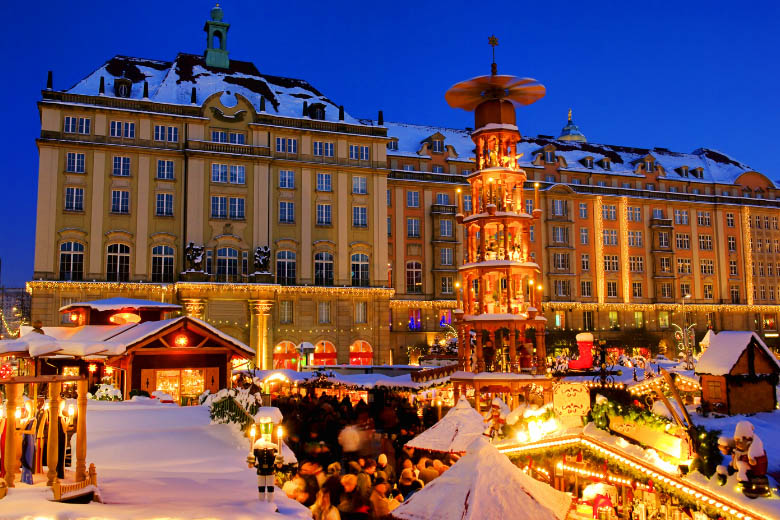
Below you can easily compare hotels near the most popular Christmas Markets in Germany:
- Dresden (oldest and largest Christmas Market in Germany)
- Rothenburg ob der Tauber (Germany’s famous Christmas town)
- Berlin (the city with the most Christmas Markets in Germany)
- Nuremberg (the most beautiful Christmas Market in Germany)
- Munich Christmas Market
- Cologne Christmas Market
- Dusseldorf Christmas Market
- Stuttgart Christmas Market
- Hamburg Christmas Market
6. Dress Warmly
What to wear to Christmas Markets in Germany? Good question!
It gets pretty cold during December in Germany. Temperatures often drop to a few degrees above zero. That’s around 32 Fahrenheit for our US friends. And if you’re really lucky, it may even snow.
It doesn’t get more magical and festive than a White Christmas!
Our tips for dressing warmly are to dress in layers and to wear a big warm jacket that covers you up to your knees at least.
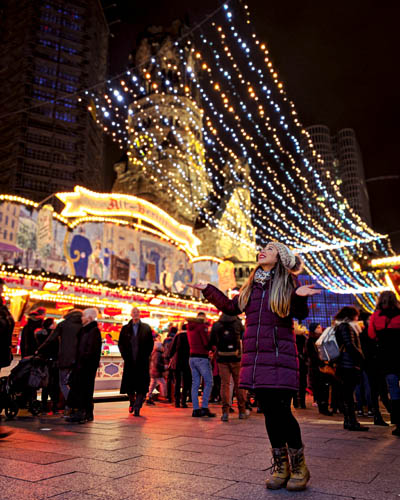
We’d also recommend wearing thermal vests and pants if you get cold easily. Whatever you do, make sure you wear hats, gloves, scarves, as well as warm and comfortable shoes, which are a must. Bonus if they’re waterproof!
Bonus Tip: Keep your phone in the inside pocket of your jacket so that the frigid cold doesn’t drain your battery. Alternatively, bring a portable power bank so your phone never runs out of juice!
7. Take Public Transport or Uber Home
If you’ve overindulged in gluhwein, make sure you don’t drive, cycle, or ride an e-scooter back to your hotel.
It’s not worth getting in trouble with the police and risking a hefty fine. Public transport is extensive and convenient to use in Germany. Simply take the train, tram, metro or bus.
Alternatively, you can also grab an Uber or Bolt to take you back to your hotel.
Bonus Tip: If you do want to experience the cycling culture in Germany (pre-gluhwein), make sure you read our 24 Rules For Cycling in Germany guide.
8. Visit Christmas Markets During Week Days to Avoid the Crowds
The best time to visit to avoid the crowds is on weekdays. Weekends are by far the busiest days to visit, especially closer to Christmas Eve.
The opening times for German Christmas Markets are usually between 11AM and 2PM. Most markets will close at 10PM to abide by ‘Ruhezeit’ (quiet time) so they don’t disturb nearby residents.
The earlier in the day you go, the quieter it is. But the best time to visit Christmas Markets (in our opinion) is between 4PM and 5PM during what photographers call ‘blue hour’.
Not only is this a dreamy time to take photos. But it’s also the perfect time to visit to avoid the worst of the crowds.
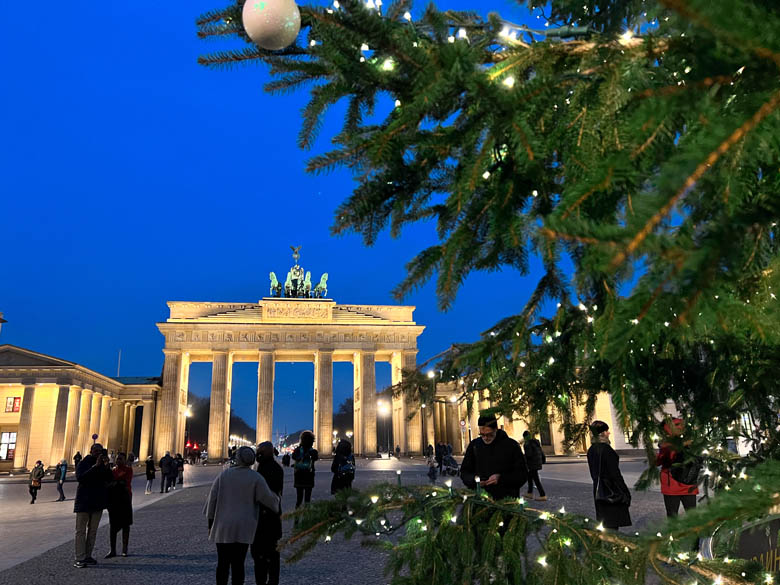
Related Guide: Another way to avoid the crowds is to visit smaller, lesser-known Advent markets. Advent markets are a German Christmas tradition that is even older than Christmas markets. Many tourists don’t know about them but in many ways, they’re more enjoyable to visit. They’re less crowded, less touristy, cheaper to visit and offer a more authentic local experience. If you’re heading to the German capital, make sure you check out there 8 Berlin Advent Markets.
9. Kid-Friendly Christmas Markets in Germany
Almost all Christmas Markets in Germany are family and kid-friendly. But some are more kid-friendly than others.
Some have outdoor ice skating rinks, dreamy carousels (merry-go-round), giant Ferris Wheels, and even toboggan runs! So make sure you do some research and see which ones are your kids will enjoy most.
Bonus Tip: If you’re visiting Xmas Markets in Germany with kids, get them ‘Kinderpunsch’. It’s a non-alcoholic mulled cider that’s the perfect alternative to the boozy gluhwein.
10. Visit More Than One Xmas Market
You may not know this if it’s your first time, but most cities and large towns in Germany host multiple Christmas Markets – not just one.
In the German capital – Berlin alone, there are over 80 Xmas markets to visit! Do you now see why people say that no country does Christmas better than Germany?
Again, do some research beforehand so you have a list of markets to visit.
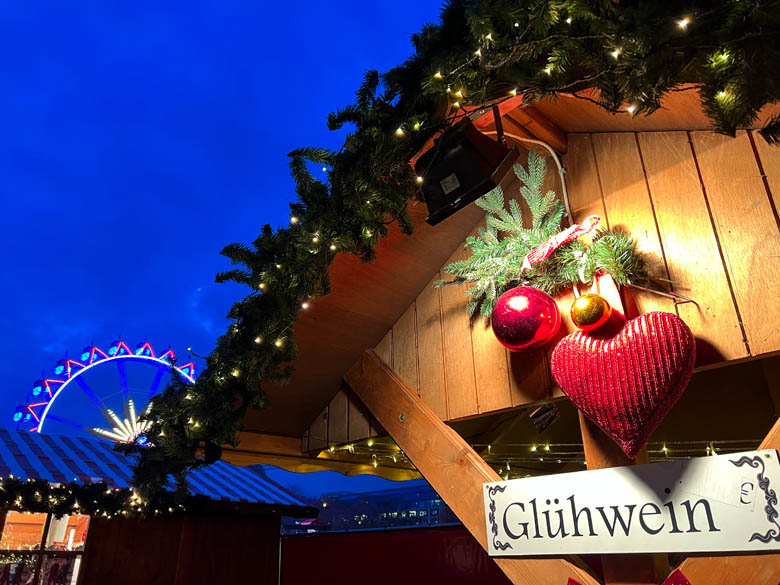
If you’re visiting Berlin (our home city), then you’re in luck because we’ve done the research for you.
Read our Berlin Christmas Markets guide where we’ve put together the best ones to visit from the most popular to the least touristy.
11. Security at Christmas Markets in Germany
Germany is a pretty safe country to visit. But given past events, security is more stringent at some of the most famous German Christmas Markets.
Our tip to you is to not bring large backpacks or rolling luggage and suitcases with you when visiting Christmas Markets in Germany.
For safety reasons, you may be refused entry if your bag is too big. Better be safe than sorry and leave large bags behind at your hotel. Handbags or smaller bags are fine but they may be checked at some markets before you enter.
Bonus Tip: If you want to be a more eco-friendly traveler, bring your own shopping bag for your purchases or for collecting your Christmas mug souvenirs.
12. Corona Rules for Visiting Christmas Markets in Germany
There are currently no special covid rules or travel restrictions in Germany for 2025 (touchwood!). Let’s hope it stays that way.
If you’re unsure, you can always double-check on the German Federal Ministry of Health page.
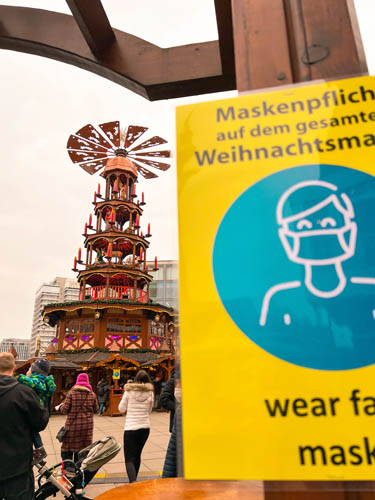
Don’t Forget Travel Insurance
Travel insurance will protect you against injury, illness, theft and even trip cancellation. It’s comprehensive cover in case anything goes wrong. We never go on a trip without it as we’ve had to use it many times in the past. Here are our favourite companies that offer the best value and service:
- SafetyWing (best for everyone)
- AXA (for US residents)
- Outbacker (for UK residents)
- Allianz (for Germany residents)
13. Basic German Phrases for Visiting German Christmas Markets
Last but not least. Some tips for basic German phrases to know when visiting Christmas Markets in Germany!
Most people working at German Christmas Markets can speak some English. But it’s always nice to learn a few basic phrases in German too. It’s part of the travel experience and you may even get a free shot (‘mit schuss’) with your gluhwein if you attempt German with a smile.
| English | German | Pronunciation |
|---|---|---|
| Hello (Formal) | Guten Tag | goo-ten tag |
| Hello (Informal) | Hallo | ha-low |
| Thank you (Formal) | Vielen Dank | fee-len daank |
| Thank you (Informal) | Danke | daan-ke |
| One gluhwein please | Einmal glühwein bitte | ein-mal gloo-vine bitter |
| Two gluhwein please | Zweimal glühwein bitte | zwai-mal gloo-vine bitter |
| I would like my deposit | Pfand bitte | fund bitter |
| Merry Christmas | Frohe Weihnachten | froo-he vai-nag-ten |
| Bye | Tschüss | shoos |
What is Christmas Market in German?
Weihnachtsmarkt (‘w’ pronounced as ‘v’)
Frequently Asked Questions (FAQ)
Yes – you’ll need cash when visiting Christmas markets in Germany! Most food stalls and vendors are not card-friendly except for a minor few who sell bigger ticket items (€50 or more) like handmade Christmas decorations. Make sure to bring a mixture of small notes (€10 and €20) as well as coins. You may need to pay €0.50 or €1 to use the toilets at some German Christmas Markets.
Dress warmly – it gets pretty cold during Christmas in Germany. Dress in multiple layers and make sure to wear a big warm jacket that covers you up to your knees at least. If you get cold easily, we’d recommend wearing thermal vests and pants. And of course, don’t forget to wear a warm hat, gloves, and a scarf, as well as warm and comfortable shoes, which are a must. Bonus if they’re waterproof!
Absolutely! If you want to keep your Christmas market mugs as a souvenir, simply don’t ask for your ‘pfand’ (deposit) money back.
The best time to visit Christmas markets in Germany is from the end of November (after the 24th) till the first 3 weeks of December. This is the time when most Christmas markets will be open. Visit during the weekday just before sunset to avoid the worst of the crowds.
Dresden Christmas Market – Striezelmarkt
Rothenburg ob der Tauber – often known as the Christmas capital of Germany. It’s famous for being home to the world’s only Christmas Museum and one of the few places in the world where you can buy Christmas products any time of the year.
Most Christmas Markets in Germany are free to visit (i.e. no entrance fees) but there is a handful that charges entrance.
Which Are the Best Christmas Markets in Germany?
- Dresden (oldest and largest Christmas Market in Germany)
- Rothenburg ob der Tauber (Germany’s famous Christmas town)
- Berlin (the city with the most Christmas Markets in Germany)
- Nuremberg (the most beautiful Christmas Market in Germany)
- Munich
- Cologne
- Dusseldorf
- Stuttgart
- Hamburg
- Leipzig
- Rudesheim
Are There Christmas Market Tours in Germany?
Yes, there are guided Christmas Market tours you can join in Germany!
Here are some of the most popular ones:
- Munich Christmas Market and Christmas Village Tour (2 hours)
- Nuremberg Christmas Market and Old Town Tour (1.5 hours)
- Dresden Advent Tour with Stollen and Mulled Wine Tasting (1.5 hours)
- Rudesheim Christmas Boat Tour on the Rhine River (2 hours)
- Heidelberg Christmas Market Walking Tour (1.5 hours)
- Cologne Christmas Magic Guided Tour by Bike (3 hours)
- Berlin Winter Lights by Trabi Limousine Tour (1.5 hours)
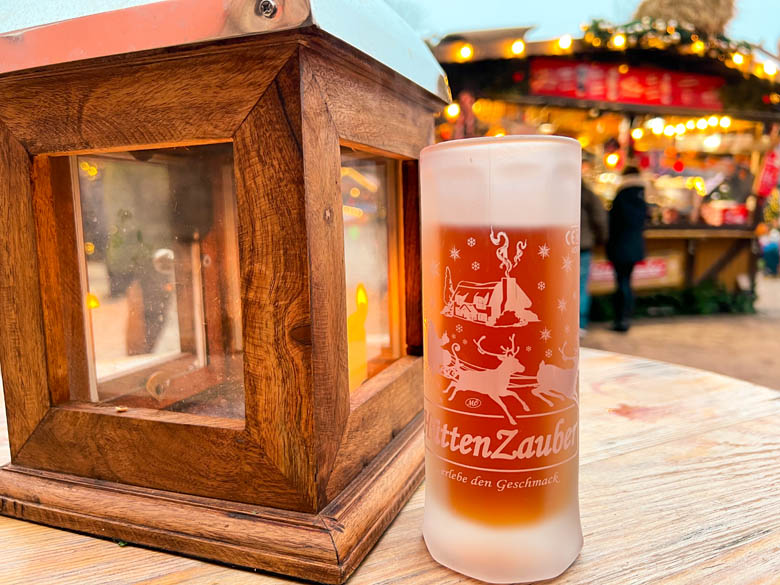
Wrapping Things Up
Nothing beats getting the true Christmas market experience anywhere but in Germany. After all – it’s the country that invented many of the Christmas traditions we celebrate today.
We hope our insider tips as expats living in Germany have helped you get the most out of your Christmas market experience. If you have any other questions, feel free to reach out to us on any of our channels mentioned below.

